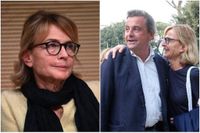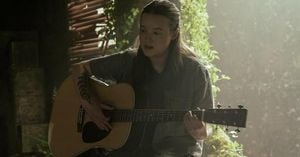Cristina Comencini, the acclaimed Italian director, recently opened up about her life, career, and the success of her latest film, Il treno dei bambini, in an extensive interview with Corriere della Sera. The film, based on the novel by Viola Ardone, has garnered nearly 30 million views on Netflix, a figure that Comencini finds astonishing. "It seems incredible, especially considering how many people might be in front of a screen... I tried to give a reason," she shared, attributing the film's success to its universal theme: "Wars do not end when the fighting stops; the disasters they cause in relationships continue over time. We lose the value of human connections, motherhood, and the care of children. This is illustrated by the photo of the child from Gaza with amputated arms that won the World Press Photo. What do we tell the little ones?"
Comencini's film has also resonated with younger audiences, as it has been widely requested in schools. Reflecting on her interactions with students, she recounted a poignant moment from a visit to a school in Naples. One student remarked, "They were so poor, much more than us. But they went up north; we don’t move anymore." This exchange highlights the film's exploration of hope and resilience amid adversity.
In discussing the shift in cinematic platforms, Comencini expressed her belief in the importance of authentic storytelling, regardless of the medium. "Bringing people to theaters is beautiful, albeit challenging. My effort is to make authentic films. As my father used to say, 'I do not change,' whether it's a TV adaptation of Pinocchio or big films for the cinema. One must always strive for the highest level of truth and beauty," she stated.
Having received numerous accolades, including an Oscar nomination for La bestia nel cuore, Comencini reflected on the nature of success in the film industry. "The nomination was a great joy, unexpected. I was working on a documentary about Rwanda at the time. Success is important and gratifying, but this profession is a rollercoaster; you learn to be happy when success comes because it can leave you at any moment. For instance, there’s a film I loved, Quando la notte, which did not do well at all," she explained.
Comencini, who is the daughter of renowned director Luigi Comencini, has witnessed the rise of female directors in the industry. She expressed her support for this trend, stating, "I am with them until death. Finally, cinema has opened up to women's stories, representing a new wealth of possibilities. Paola, before being a great director, was a great actress—perfectionist, intelligent, kind, and profound. Her film about women's voting in the post-war era sheds light on a piece of history that has always been told only by fathers. In this flourishing, there’s Greta and several nominations for the David di Donatello awards: Valeria Golino, Delpero with Vermiglio, which is very beautiful, and my sister too."
When asked about familial dynamics, specifically regarding her sister Francesca's film that explores their father’s struggles with addiction, Comencini noted, "We four sisters are a phalanx. We have always been united in all aspects of life. She made us read the script. The choice she made to isolate her relationship with dad, much like Bergman did in Scenes from a Marriage, I found original and right. Otherwise, it would have been the usual story of a complicated adolescence. I told her, 'Go ahead and be at peace.'"
Comencini also reflected on her privileged upbringing and the importance of social justice. "I know I have been privileged because I had that father and mother, a rich emotional and cultural upbringing, and many books. We are a generation that has fought in various forms for social justice. That should be the work of politics: to erase the differences in status and wealth that are growing ever larger today," she remarked.
Her political engagement has primarily focused on feminism. "My only true political commitment was during the feminist movement, where it became clear to me that women's thought—artistic, social, political—was possible if we became a collective subject. It’s a profound conception that permeates my life," she expressed. When asked about the current political landscape, particularly regarding Giorgia Meloni, Comencini stated, "I am a woman of the left, albeit not extreme; she is a conservative woman on the right. We do not share political thoughts. However, she is doing her part well."
Comencini's personal life has also been a topic of interest. She had her son, Carlo Calenda, at the age of 18. Reflecting on their relationship, she said, "Did we grow up together? Completely. And shortly after, Giulia was born. Then Luigi arrived, and then Carlo’s son was born. I spent my youth with children; I practically raised four kids. I took them everywhere, even to university to take exams."
She candidly discussed her experience with motherhood, including her decision to have an abortion at 17. "Of course, I thought about aborting. But it had already happened that I aborted a child with the man I loved, who later became my husband. I suffered a lot. I did not want to repeat that," she shared. On the topic of abortion laws, Comencini expressed confidence that they would remain unchanged, stating, "They know that a billion people would take to the streets."
As for her reflections on lost youth, Comencini remarked, "It went that way. I am writing about it in my upcoming novel, L’epoca felice, which will be released in October 2025. I talk about adolescence, which is a fundamental moment in life, even with its craziness... but then you calm down and force yourself into roles that are not yours, and you lose your identity. But life surprises you and takes you where you do not want to go. Having children so early gave me the richness of everything I have written."
Comencini's current relationship with French documentarian François Caillat has also brought her joy. "We met at the Festival du Film Italien de Villerupt in Lorraine. I didn’t even want to go; I was feeling a bit down at the time," she admitted. Their romance has blossomed through their shared experiences and correspondence. "We live between Rome and Paris; our life is complicated by constant movements, but perhaps also brightened. They are two beautiful cities, and this love has reopened this sense of coupledom," she explained.
Reflecting on the nature of love at an older age, she mused, "In my new book, the two protagonists meet as teenagers and find each other again later in life for incredible reasons. There’s that reckless impulse of youth... but at 60, you are free inside, without obligations of children, you know the limits of the couple and the feeling. You let yourself go without dangers."
When asked about what she misses most, she replied, "My mom. She was complex, but when I traveled, I always called her to say, 'I’ve arrived.' We will all meet again in the same place." On the topic of faith, she stated, "I have no faith. But I have always thought that we do not see everything that exists."






